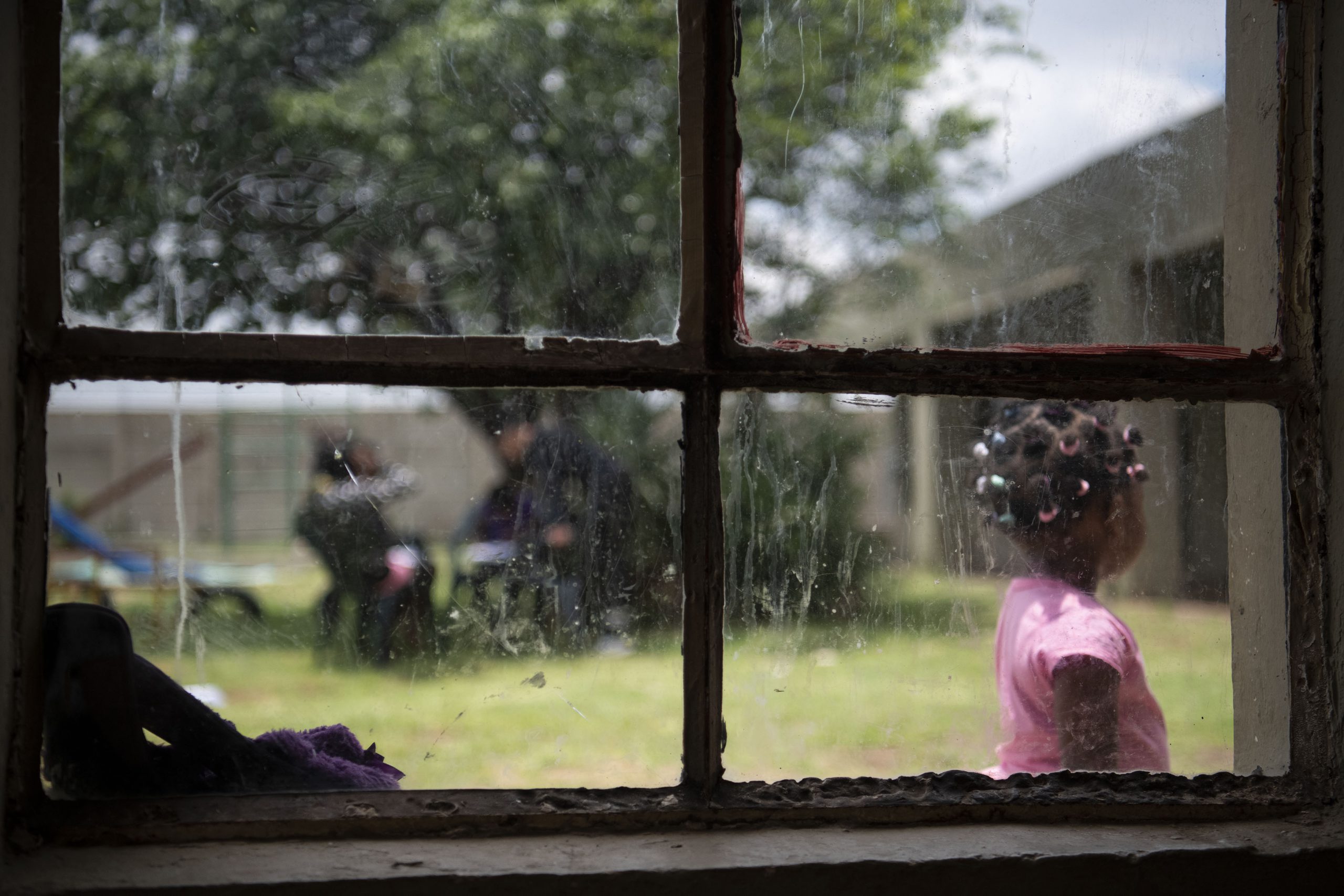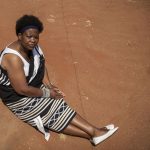Women’s shelters struggle for funding
South Africa has one of the highest rates of gender-based violence, but its shelters are battling to stay afloat – and government departments have been slow to explain why.
Author:
29 January 2020

The Eldorado Park Women’s Forum shelter in south Johannesburg stands amid rehabilitation houses, a school and a children’s home. Registered in 2002, the location of the shelter is kept private for safety reasons, so as not to expose the women in its protection.
There are cracks in the ceiling of the living room and the posters lining the walls include one of the victim’s charter, informing residents of the shelter of their rights. There’s also a health permit on the wall and a small television. The flat-screen television has been sent for repairs.
While it has 24 beds for survivors of gender-based violence and human trafficking, the shelter receives funds from the Department of Social Development for only 12 beneficiaries. It is struggling financially and director Evans Gassi says limited funding is the shelter’s main challenge.
Twelve of the shelter’s 24 beds are in outside rooms. This extension to the building was done after the shelter was initially registered, so they are not included. As such, the shelter has to get an updated health and safety certificate for the additional rooms from City of Joburg Environmental Health and then take this to the social development department to raise its funding to 24 beneficiaries.
“We try and make the rand stretch a bit,” says Gassi, explaining how the shelter tries to accommodate 24 on a budget for 12. When the shelter is full, it has to redirect funds that are meant for admin expenses, he says.

Human trafficking
The shelter works with the International Organisation for Migration (IOM), whose mission includes the promotion of international migration law, policy debate and guidance, protection of migrants’ rights, migration health and the gender dimension of migration.
Some of the survivors of human trafficking that have been housed at the shelter come from Thailand, India, Kenya, Zimbabwe and Lesotho, underscoring its global nature. “IOM would send an interpreter should we need one,” says Gassi. Other residents end up at the shelter as a result of interprovincial trafficking. Referrals in these cases come from the social department, as well as special investigative unit the Hawks.

Referrals in cases of assault, rape and domestic violence come from victim empowerment centres at police stations in areas such as Kliptown, Eldorado Park, Lenasia South and Moroka. Residents also come from hospitals, the courts and Thuthuzela Care Centres, which the government set up countrywide as part of its anti-rape strategy.
Social worker Amanda Lande offers psychosocial services, counselling and therapeutic work. These are mainly in the form of a group session at the shelter every Monday. She also counsels those who have been trafficked. The shelter’s human restoration programme runs for nine weeks. “We help them with protection orders … and we help them heal,” says Lande.
Additional challenges
The shelter lacks the ability to meet the needs of people who have special physical needs. Social auxiliary worker Liezell Gassi says a lack of rails in the bathrooms hampers wheelchair users. “The housemothers need to assist them getting in the bath and out of the bath,” she says. And the only wheelchair ramp is at the front door, making it the sole point of entry and exit.
Gassi says it’s difficult to attend to women with psychiatric conditions. “A lady that’s bipolar and schizophrenic is a person we cannot accommodate due to the staff. Our housemothers are cooks and not trained to deal with people with mental disabilities,” she says.

Regarding LGBTQIA+ people, Gassi says the staff are respectful but tensions often arise among residents who don’t understand that everybody needs to be treated equally. In such cases, “we move the beneficiary to a room that is more comfortable”. The shelter also runs a programme on cultural and sexual differences to encourage residents to respect each other’s lifestyle choices.
Another challenge is the lack of family units. The communal nature of the shelter means it makes use of bunk beds, which makes it difficult to house women with sons – boys aged 13 and older are forced to seek accommodation with relatives.
Staff constraints
The shelter has a social worker, a social auxiliary worker, three housemothers, two cooks and a handyman/driver. The wages for the cooks and the handyman/driver don’t meet the national minimum wage requirements.
“The amount of money for a driver, it’s not worth the amount of driving that person must do,” says Gassi. The driver has to transport the women to court, to psychologist and medical appointments, and court preparation sessions. “It’s a lot of work, so that person literally drives the whole day.”
Related article:
Both social workers admit that there’s a lot of overtime work done at a shelter. “It should be compensated,” says Lande.
Maintenance is an issue. “The admin costs are not enough in terms of having to run the shelter, so that’s where we are struggling. That’s why you would find our maintenance issues are a bit hectic,” says Evans Gassi.
The department imposes an additional challenge. “Every year, the payment is a bit late … The money is supposed to be in in April, but most likely it’s going to be in a month or two late,” says Evans Gassi.

Skills development
The shelter strives to upskill the women it houses. Gassi says some residents face employment challenges as they did not finish high school. “What we wanted to do is have a skills programme that is accredited … [and have the women] do an adult basic education and training course,” says the director. “But the short stay does not allow for that.” Also, when women arrive at the shelter they are often in no state to do anything, and Gassi says the shelter places greater emphasis on getting them to a level where they are able once again to function psychologically.
The shelter offers social and economic support as part of its exit plan for each woman as they reintegrate into society. But the courses the shelter offers are “not much”, says Gassi. A private company pays residents to make fridge magnets and the housemothers give baking lessons, but the shelter’s sewing machines are broken and this has put a halt to sewing lessons.
Related article:
Gassi says the department has encouraged the centre to partner with development centres in the area, but “we did that before and … there was a lady who had been gang raped and she saw some of the perpetrators, and it freaked her out”. As a result, the shelters prefer programmes to be in-house.
Liezell Gassi says personal preference influences the residents as not everyone is interested in baking or making magnets. They do try and encourage the women to make magnets though, “because at least there’s compensation involved”.
Residents who are there because of human trafficking stay longer than those who seek help for gender-based violence, and accommodating the former is tricky and difficult, says Gassi. “You find that a human trafficking survivor who has been with us for a long time has to do the same programme repeatedly and then it’s not beneficial to them … They start to feel like they are prisoners.”
No government response
The Commission for Gender Equality held public hearings in December after publishing a report titled Investigative Report: State of Shelters in South Africa. The week-long hearings were to assess the state of shelters for victims of gender-based violence, people who identify as LGBTQIA+ and those who are differently abled and so have particular needs.
The commissioners expressed dissatisfaction and disapproval at the various government departments called to answer about the state of shelters. Commissioner Tamara Mathebula, the chairperson of the Commission for Gender Equality, addressed representatives from North West province who failed to answer the commission’s questions.

“We are not here to play … We have experienced serious challenges in terms of getting information that we need,” she said. Mathebula then read the questions back to them. “Are you going to provide us with responses or answers to those now? … I am just wondering whether you are aware you are an accounting officer for the Department of Social Development in the province of North West. I am not sure if there is an understanding of your mandate … I am not too sure if you are taking this process seriously.”
‘Lack of synergy’
Commission spokesperson Javu Baloyi said: “The hearing also raised poignant issues that seem to show a lack of synergy and coordination from various departments on how to address the state of shelters and the gender-based violence that is persistent in these shelters.”
He added that the dysfunctionality of some shelters impacts tremendously on the fight against gender-based violence.

“South Africa has one of the highest rates of gender-based violence in the world,” says the commission report, which helps explain why shelters such as the Eldorado Park Women’s Forum exist. As Gassi says, it’s owing to the “plight of women linked to domestic violence”. The report says, “it is clear from the responses that the allocation of money is not in respect of the demand for shelters and/or the rate of gender-based violence”.
Zubeda Dangor from the National Shelter Movement said she was “very disappointed with several presentations” during the hearings. “One got a sense that shelters and issues of intimate partner violence were not taken seriously. What was also disappointing was that the presentations did not always focus on what was requested by the CGE [Commission for Gender Equality] … It was clear that very little was done by the various departments.”
The Department of Social Development failed to respond to questions by the time of publication.



